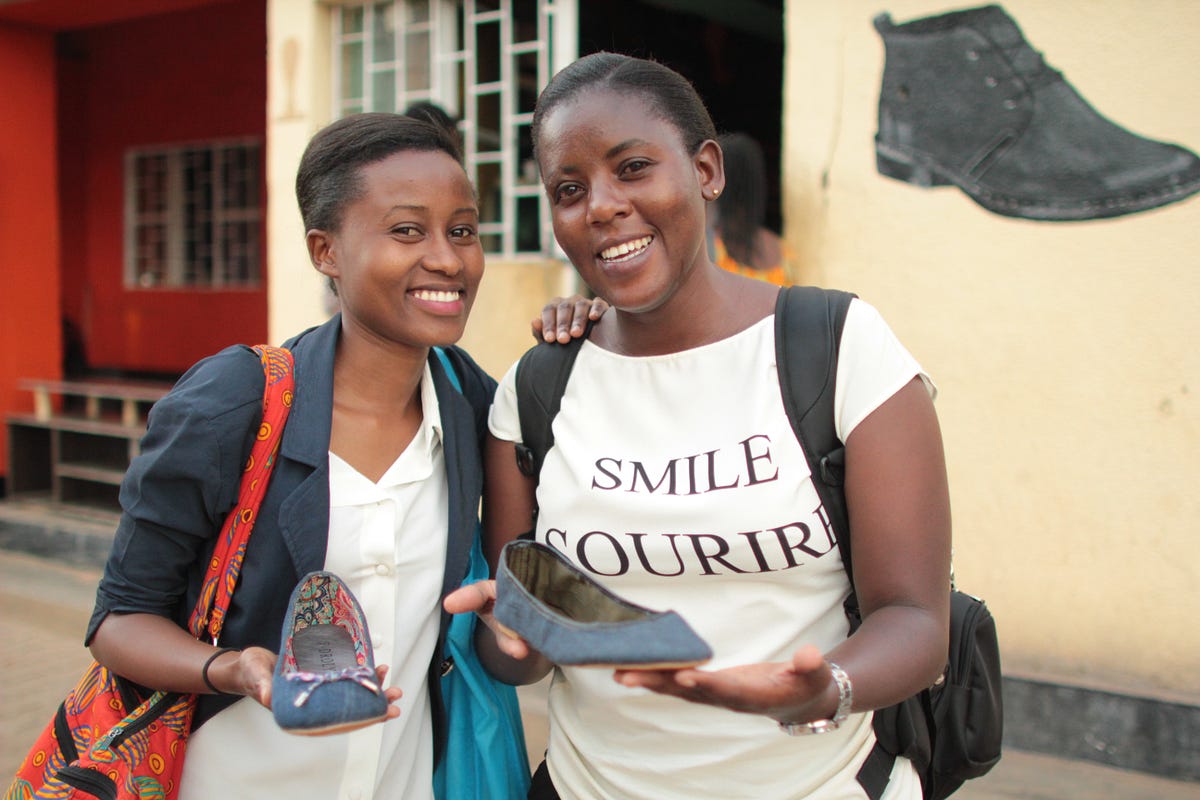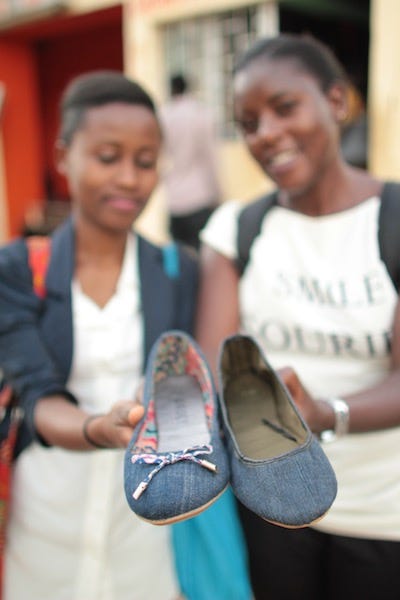An Akilah Student Entrepreneur Turns Old Shoes Into Fashionable Footwear

Charlotte Musengimana, right, started a business upcycling shoes.
When Charlotte Musengimana was in her first year in Akilah’s Business Management and Entrepreneurship Diploma program, she was given the task of starting a business with very little capital and making it profitable within just a few weeks. At first, she didn’t know where to begin.
She and her project partner tested several business ideas, all revolving around their common passion for design and fashion, but they crossed them off one by one — the concept wasn’t strong enough, not profitable enough, not unique enough.
Then one day they got it. They would “upcycle” used shoes with denim fabric, making them look as good as new for a very affordable price.
“I’m passionate about providing services to people. I saw how young people can have a hard time affording new shoes — they’re often very expensive. I got the idea of remaking shoes with jean fabric. I thought, if I can take old shoes and make them look new, I can save people a lot of money and still give them the feeling of having new shoes. I can design the shoes just how people want them and make them look very stylish for an affordable price,” Charlotte explains.

Upcycled and stylish
What started as a school project has now turned into a profitable business for Charlotte. She is in her final year at Akilah and runs the shoe business alongside her studies.
“When I saw that I could make a profit, I decided to continue the business even after the project ended. It helps me to get a bit of extra money without having to ask my parents for support,” Charlotte explains. “And as an Entrepreneurship and Business Management student, it gives me good experience to run my own business. I’m learning how to deal with customers, how to make them feel comfortable, how to improve my product design, and a lot more. All the things I’ve studied in school, I’m now practicing in real life,” she says.
A sustainable strategy
Charlotte initially started by buying secondhand shoes in the market, recovering them with denim fabric, and selling the newly refurbished shoes to customers.
But as with all business ventures, Charlotte’s shoe business ran into challenges, especially in terms of supply. “Getting affordable secondhand shoes in the market is not easy, especially because Rwanda is now phasing out sales of secondhand clothes and shoes,” she explains.
“And as an Entrepreneurship and Business Management student, it gives me good experience to run my own business … All the things I’ve studied in school, I’m now practicing in real life.”
“I realized it’s better to find people and convince them to give us their old shoes so we can make the pair seem like new again,” she explains. “We get the jean fabric from the market and work with a local tailor to turn our designs into reality.”
Today, she offers both options to her growing number of customers — including fellow Akilah students.
Innovation and impact
While it can be challenging to juggle a tight schedule at school with her business, her passion for the work gives Charlotte the energy to keep going.
“It makes me happy. I’m passionate about design. I like to work with shapes, design new things, and make them look good. It makes me feel good when I can do that for other people and make it into a business. At the same time, it’s recycling, which is good for the environment. This is also something I am looking more into now. How is this business supporting my community? How can I make an impact?” Charlotte explains.
“In the future, you will see me as a big business woman. Just wait and see.”
Dreaming big
For Charlotte, this is hopefully just the beginning of her business venture. Soon she will be pitching her idea to a business accelerator program for youth in Rwanda. She plans to use the opportunity to continue learning and to access funding for future growth.
“My dream is to build an industry for shoes like this and to help support the Made in Rwanda brand. That way, we can improve Rwanda-made products and help grow the economy.”
Thanks to the experience she has gotten through her business, Charlotte — although humble and often shy at first — is not afraid to dream big.
“In the future, you will see me as a big business woman. Just wait and see,” Charlotte smiles.
